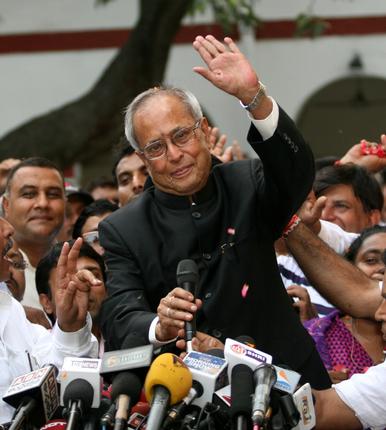 New Delhi, July 23: Pranab Mukherjee on Sunday scripted history by becoming the first person from West Bengal to be elected as the President of India. He defeated his opponent, former Lok Sabha speaker P A Sangma, with a huge margin to be elected as the 13th President of the country.
New Delhi, July 23: Pranab Mukherjee on Sunday scripted history by becoming the first person from West Bengal to be elected as the President of India. He defeated his opponent, former Lok Sabha speaker P A Sangma, with a huge margin to be elected as the 13th President of the country.
Following the declaration of the results, Mukherjee thanked the people of the "great country" for his win with a record margin of sorts bagging 69 per cent of the votes.
"I express deep gratitude for electing me to high office," said Mukherjee.
Addressing mediapersons, he further said, "I thank all those who supported me…I thank Sangma for congratulating me." He said he would try to justify the trust of people, adding, "I have received much more than I have given".
Meanwhile, though Sangma congratulated Mukherjee on the win, he lashed out at his opponent saying the poll was not fair. Sangma did not even rule out moving court on the election, saying its process was "exceptionally partisan".
Not ruling out moving the Supreme Court on the election, he said, "We are meeting a day after tomorrow to review the whole situation where this matter will come up for discussion."
Addressing mediapersons, the former Lok Sabha speaker said the presidential and the vice presidential elections must have a code of conduct to make the elections fair.
When asked to clarify on his statement that the elections needed to be made fair, Sangma said that several states were given financial packages.
Sangma accused the UPA of indulging in unfair practices saying the election was not fair and the country had lost a great opportunity to elect a tribal President. "Election process was exceptionally partisan and political through economic and other packages, inducements and threats," he said.
"I might have lost the elections but nation also lost an opportunity to project a tribal as President. I thank Pranab Mukherjee for winning the Presidential poll," he told reporters.
"There is compelling need for establishing an election code of conduct in Presidential elections. Presidential and Vice-Presidential elections should have a code of conduct," he said, when asked to clarify on his statement that the elections needed to be made fair. He said that several states were given financial packages.
On asked if he will go to the court, he said, "We are meeting in a few days to discuss all these issues. We knew that there was a problem in Karnataka. Results also show in many places there was cross voting."
However, even before the election commission declared the final results, there was a steady stream of visitors at the residence of the former finance minister to congratulate him on the massive victory.
Among the early callers at his Talkatora Road residence, located not far from Parliament House, were Prime Minister Manmohan Singh, UPA chairperson Sonia Gandhi, Congress general secretary Rahul Gandhi and ministers from the UPA Cabinet.
Sonia Gandhi and party general secretary Rahul Gandhi came together ahead of the Prime Minister's visit to greet the 76-year-old veteran. They were soon joined by Singh and his wife Gursharan Kaur.
Lok Sabha Speaker Meira Kumar, Union ministers A K Anthony, P Chidambaram, Sushil Kumar Shinde, Subodh Kant Sahai, Farooq Abdullah and E Ahamed visited Mukherjee's residence to greet him for becoming the 13th President of India.
"We thank our all our allies for the victory of Pranab Mukherjee as the President of India. This is an emphatic victory," Chidambaram said after meeting Mukherjee.
DMK leaders T R Baalu and Murasoli Maran also met Mukherjee to greet him.
West Bengal Chief Minister Mamata Banerjee, who had earlier opposed the candidature of Mukherjee for the presidential elections but decided to back him two days before the voting, also congratulated Mukherjee. She also accepted the invitation by the President-elect to attend his swearing-in ceremony. The Trinamool Congress chief also invited Mukherjee to visit West Bengal first after the win.
Later, leaders from Opposition Bharatiya Janata Party (BJP) and Left parties also congratulated the man of the moment.
However, the BJP in Karnataka suffered a humiliation when Mukherjee secured a backing of 117 MLAs as against Sangma's 103, with some party members cross-voting in favour of the UPA nominee.
Mukherjee had a pledged support from only 98 MLAs – 71 from Congress and 27 from JD(S) – but he managed to secure the support of 19 more legislators.
Sangma could only garner 103 votes, even though the BJP has 119 members in the Assembly.
The counting of votes for the Presidential election was done in Room number 63 of Parliament. Six groups were formed for the counting of votes.
The six groups were:
Group 1: Andhra Pradesh, Gujarat, Kerala, Nagaland, Tripura and Parliament
Group 2: Arunachal Pradesh, Haryana, Madhya Pradesh, Odisha, Uttarakhand
Group 3: Assam, Himachal Pradesh, Maharashtra, Punjab, Uttar Pradesh
Group 4: Bihar, Jammu and Kashmir, Manipur, Rajasthan, West Bengal
Group 5: Chhattisgarh, Jharkhand, Meghalaya, Sikkim, Delhi
Group 6: Goa, Karnataka, Mizoram, Tamil Nadu, Puducherry
Following the counting, Rajya Sabha Secretary General V K Agnihotri officially declared Pranab Mukherjee elected as the 13th President of the country with 3095 votes valued at 7, 13, 763. His opponent P A Sangma secured 1483 votes valued at 3, 15, 987.
The total number of votes cast in the presidential elections was 4659, valued at 10, 47, 971, of which 4578 votes, at a value of 10, 29, 750, were valid. There were 81 invalid votes valued at 18, 221.
Agnihotri presented the certificate to Pranab Mukherjee on winning the presidential elections.






Comments
Add new comment